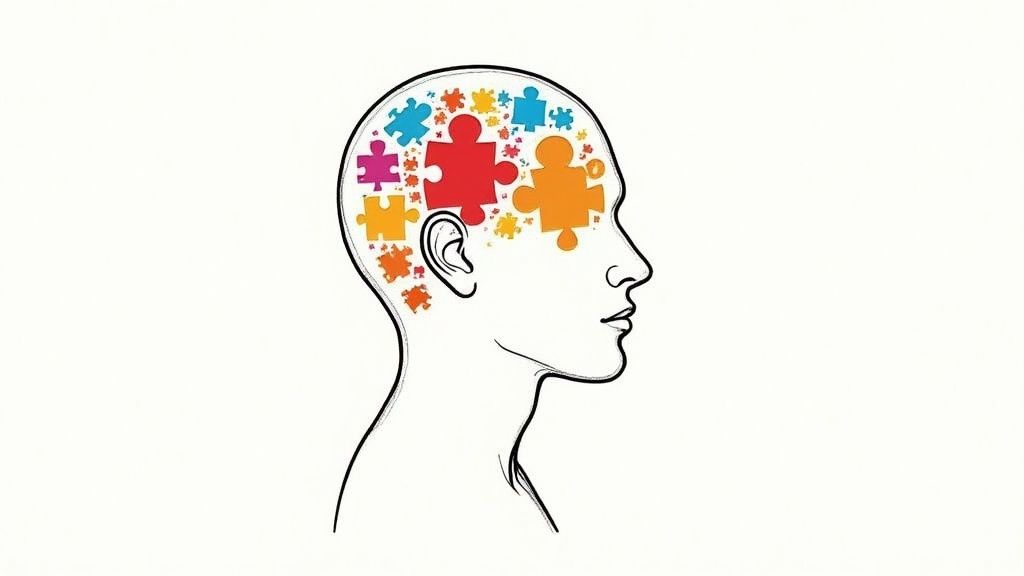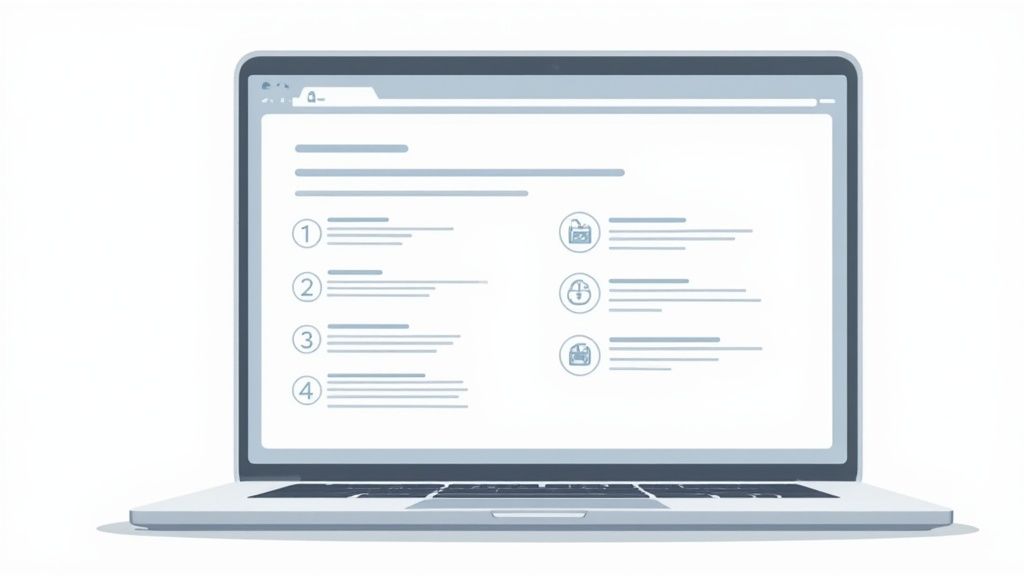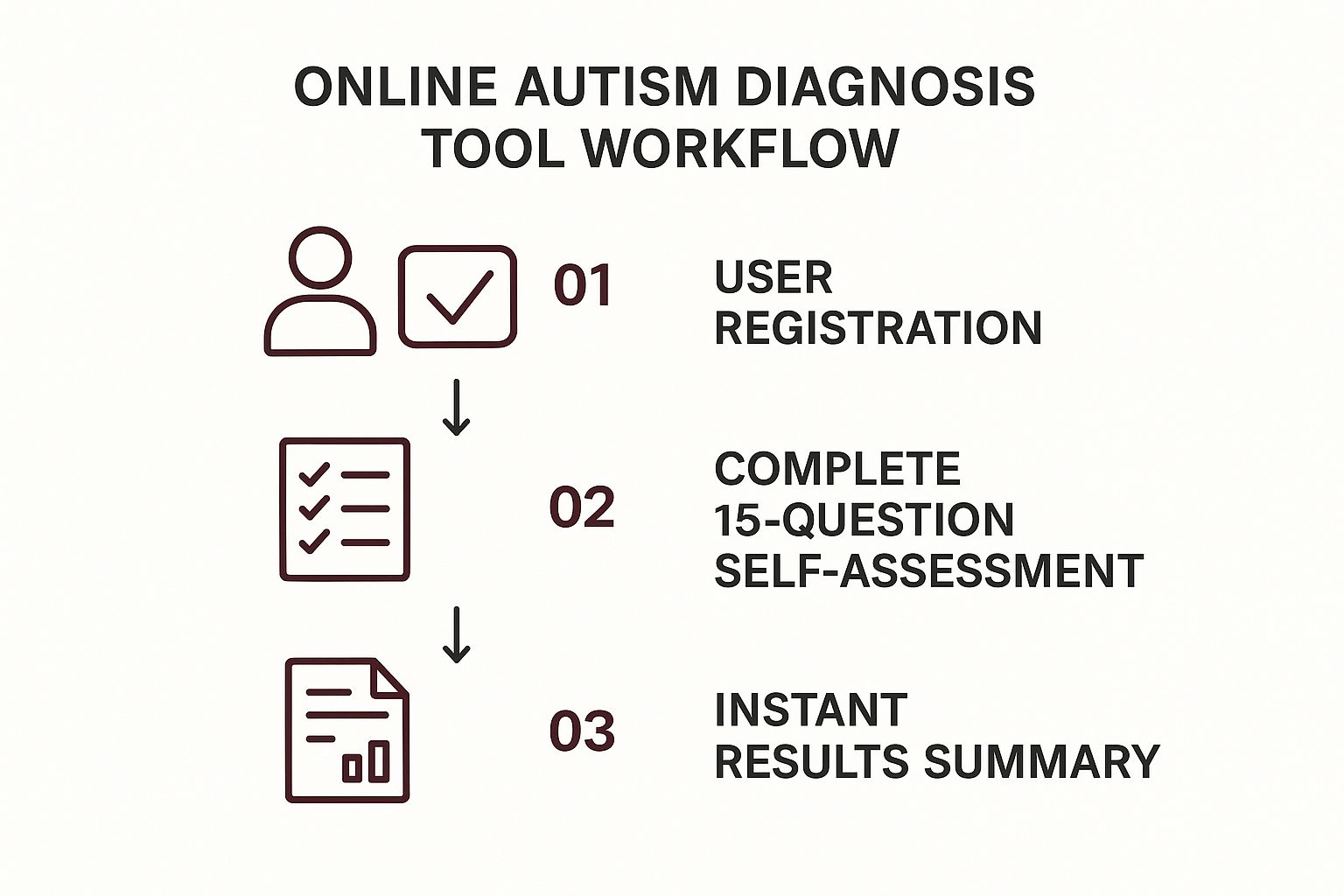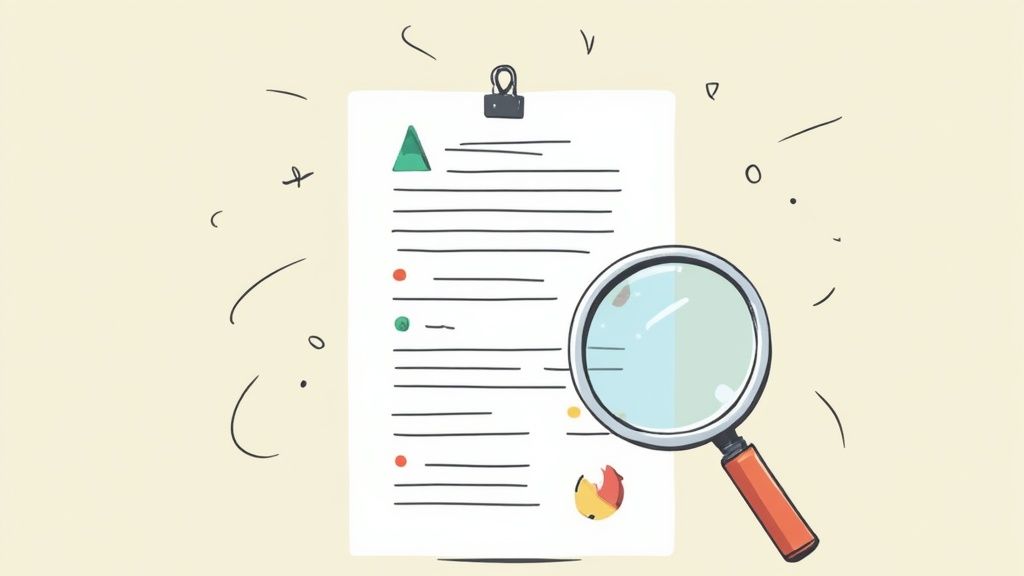Of course. Here is the rewritten section, crafted to sound human-written and align with the provided examples.
Yes, you can absolutely get a legitimate adult autism diagnosis online. Qualified psychologists and psychiatrists now offer these evaluations through telehealth, providing a much-needed alternative to traditional in-person assessments. For many adults, this makes the entire process more convenient and accessible, allowing them to seek answers right from home.
Why More Adults Are Seeking an Online Autism Diagnosis
The idea of getting an autism diagnosis later in life isn't just a fleeting trend; it's a significant shift. For decades, countless adults have moved through the world feeling fundamentally different without a name for it. With growing public awareness and the rise of telehealth, getting those long-sought-after answers is finally within reach.
An online diagnosis can be a gateway to self-understanding, especially for those who were missed in childhood. This is particularly true for women and individuals who became experts at "masking" to fit social expectations.
A Shift in Awareness and Access
So, what’s behind this change? A huge part of it is simply increased awareness. As conversations around neurodiversity become more mainstream, more adults are starting to see autistic traits in themselves.
This isn't just a feeling; the numbers back it up. One analysis showed that autism diagnoses shot up by 175% between 2011 and 2022, and that includes a growing number of adults finally getting clarity. You can find more details in this comprehensive overview of recent autism facts and figures on abacustherapies.com. This data really highlights how better detection and a wider understanding are making a real difference.
The convenience of telehealth has also been a complete game-changer. An adult autism diagnosis online breaks down so many of the old barriers:
- Accessibility: You can connect with specialists anywhere, which cuts out travel time and expenses.
- Comfort: Being evaluated in your own space can make a world of difference, reducing the anxiety that often comes with clinical environments.
- Privacy: It’s a discreet way to explore your neurotype without taking tons of time off work or explaining appointments to others.
For many, an online evaluation isn't just about convenience; it’s about finally accessing a space where their lifelong experiences can be heard and validated by a professional. It demystifies the process and makes it feel much more approachable.
To give you a clearer picture, here’s a quick rundown of what to expect when you go down this path.
Online Adult Autism Diagnosis At a Glance
| Aspect | What to Expect | Key Consideration |
|---|---|---|
| Provider | A licensed psychologist or psychiatrist with experience in adult autism. | Verify their credentials and experience with adult, online assessments. |
| Process | Multiple sessions including clinical interviews, self-report questionnaires, and sometimes interviews with a loved one. | Be prepared to discuss your developmental history and current challenges in detail. |
| Tools | Standardized diagnostic tools adapted for telehealth (e.g., ADOS-2, MIGDAS-2, interviews). | The specific tools used can vary, so ask the provider what their process involves. |
| Outcome | A comprehensive diagnostic report explaining the findings and recommendations. | Ensure the report is detailed enough for accommodations or support services if needed. |
| Cost | Can range from a few hundred to several thousand dollars. | Check with your insurance provider about coverage for telehealth-based assessments. |
This table summarizes the core components, but remember that every provider’s approach might have slight variations.
What an Online Diagnosis Really Gives You
Pursuing a diagnosis is a deeply personal journey. It’s often the first real step toward making sense of your unique cognitive and emotional world. A formal diagnosis offers a framework for your experiences, validating that feeling of being different and giving you a new lens to view your past, present, and future.
It's about so much more than a label. It's about gaining access to a community, finding tools that actually work for you, and getting accommodations that can genuinely improve your quality of life. This guide is here to walk you through every step of that journey.
How to Prepare for Your Online Autism Assessment
Getting ready for your online autism assessment can make all the difference. Think of it less like studying for a test and more like organizing your life experiences so you can share your story clearly. Good preparation helps the clinician get a full, accurate picture, which is the whole point of getting a legitimate adult autism diagnosis online.
Your main goal here is to document your personal history. You’re essentially becoming a detective in your own life, gathering evidence about your unique patterns, from social communication quirks to sensory sensitivities and those deep, passionate interests that define you.
Documenting Your Life Experiences
First things first, start what I call a "life timeline." This doesn't need to be some elaborate project—a simple document or a notebook works perfectly. The idea is to jog your memory about key moments and recurring challenges you've faced, starting from childhood all the way up to today.
As you build out your timeline, think about these key areas:
- Social Interactions: Jot down memories of trying to make friends, navigate group hangs, or even just handle workplace small talk. Did you ever feel like you were just reading from a script everyone else already knew? Did you leave parties feeling completely wiped out?
- Communication Styles: How do you really communicate? Do you prefer conversations that are direct and to the point? Have people told you that you're too blunt, or that they can't quite figure out your tone?
- Sensory Experiences: Make a list of your relationships with sound, light, touch, and even smell. Note any strong dislikes (like the feeling of scratchy tags on clothes) or things you actively seek out (like the comforting pressure of a heavy blanket).
- Routines and Repetitive Behaviors: Think about your need for routine and what happens when it gets thrown off. This is also the place to note any repetitive movements you do to self-soothe—we often call these "stims"—like rocking, tapping your fingers, or pacing.
- Special Interests: List the hobbies and topics you've become completely absorbed in throughout your life. How deep did you go? Did they bring you a unique kind of joy and comfort that other activities didn't?
A well-organized collection of your experiences is an incredibly powerful tool. It helps you find the words for thoughts that might feel jumbled or hard to explain on the spot, ensuring you don't forget crucial details during your evaluation.
Gathering External Perspectives
While your own story is the most important piece of the puzzle, getting input from a trusted friend, partner, or family member can be surprisingly helpful. Someone who’s known you for a long time might remember details from your childhood or notice patterns you’ve never seen in yourself.
For instance, a parent might recall how you reacted to changes in routine as a kid, or a partner could describe how you handle sensory-heavy places like a crowded grocery store.
If you're comfortable with it, ask them for their honest take. You could ask specific questions like, "Do you remember me having any weird habits as a kid?" or "Have you ever noticed that I get really overwhelmed in loud places?"
Their observations can add another layer of depth, but remember, this step is completely optional. The most important thing is that you feel ready to share your own lived experience authentically. The goal is to walk into your virtual assessment feeling prepared, empowered, and ready to be understood.
Finding a Reputable Online Diagnosis Provider
Once you’ve decided to pursue an adult autism diagnosis online, your next move is to find the right professional. With the rise of telehealth, the number of providers can seem overwhelming, but finding a qualified, reputable clinician is completely achievable if you know what to look for.
The goal here is to connect with someone who is not only licensed but also truly experienced in adult neurodiversity. This isn't a step to be rushed. A thorough evaluation is a significant investment—both emotionally and financially—so taking the time to vet your options ensures the assessment you receive is both valid and meaningful.
Clinician Credentials Are Non-Negotiable
First things first: you have to verify the credentials of any provider you're considering. For a diagnosis to be legitimate, it must be conducted by a licensed clinical psychologist (Ph.D. or Psy.D.) or a psychiatrist (M.D.). These are the professionals trained to perform formal diagnostic assessments, and they're bound by strict ethical and legal standards.
Be cautious of any service that relies on unlicensed "coaches" or "specialists" for the actual diagnostic part of the process. While they might offer valuable support, they simply cannot provide a formal medical diagnosis.
The demand for adult evaluations has skyrocketed. It's estimated that about 2.18% of adults in the US are autistic, with some states like Massachusetts reaching 2.42%. This growing awareness has fueled the need for accessible options, especially since employment challenges affect roughly 75% of autistic adults, making flexible online platforms a vital resource. You can explore more about these trends in adult autism on motivity.net. But this high demand also means you need to be extra careful when choosing a provider.
Understanding the Diagnostic Tools and Process
Reputable providers are always transparent about their methods. They should use a combination of well-established, validated tools to get a complete picture of your life experiences, not just a snapshot.
Some common assessment tools you'll see include:
- ADOS-2 (Autism Diagnostic Observation Schedule, Second Edition): Often called the "gold standard," this is a semi-structured interview with activities designed to observe social communication and interaction. Experienced clinicians have adapted its modules for telehealth.
- RAADS-R (Ritvo Autism Asperger Diagnostic Scale-Revised): A self-report questionnaire that helps identify adult autistic traits from your own perspective.
- MIGDAS-2 (Monteiro Interview Guidelines for Diagnosing the Autism Spectrum, Second Edition): A sensory-based interview process that helps you articulate your internal experiences in a structured way.
A proper evaluation is never just one questionnaire. It should be a comprehensive process that includes in-depth clinical interviews about your developmental history and your life today. You can learn more about what a complete online autism assessment process entails in our detailed guide.
Key Takeaway: A legitimate diagnosis comes from a combination of validated tools and a clinician's expert judgment. A single self-assessment quiz is not a diagnosis.
Questions to Ask a Potential Provider
Before you commit, think of the initial contact as an interview—where you are the one asking the questions. You have every right to make sure a provider is the right fit for you.
Here are a few questions to get you started:
- Are your clinicians licensed psychologists or psychiatrists in my state?
- What specific assessment tools and methods do you use for adult autism evaluations?
- What does the full process involve, from the first appointment to the final report?
- How much does the evaluation cost, and what exactly is included in that price?
- What kind of diagnostic report will I receive, and can I use it for workplace accommodations?
Be on the lookout for red flags. Be wary of any service that promises a guaranteed diagnosis, relies on a single short quiz, or has a confusing or hidden pricing structure. A trustworthy provider will be upfront and focused on giving you clarity, not just a label.
What Happens During the Online Evaluation
So, what actually goes on during an online autism evaluation? The idea can feel a bit abstract and maybe even a little intimidating. But once you pull back the curtain, you'll see it’s a structured, collaborative process designed to get a full, clear picture of who you are.
Think of it less like a test and more like a series of guided conversations with a professional who genuinely wants to understand your unique way of experiencing the world. An adult autism diagnosis online isn't a single, scary appointment. It's a journey.
Things usually kick off after your initial consultation with some secure online forms and self-report questionnaires. You might be asked to complete something like the RAADS-R (Ritvo Autism Asperger Diagnostic Scale-Revised), which gives you a chance to reflect on your own traits and experiences. This step is great because you can do it on your own time, really think through the questions, and lay the groundwork for the live sessions.
This infographic shows a simplified flow, similar to the initial self-assessment phase some platforms use.
While helpful, these initial questionnaires are just the start. A proper, thorough evaluation goes much deeper to make sure the outcome is both accurate and genuinely meaningful for you.
The Clinical Interview Sessions
The heart of the evaluation is the clinical interview. This is where you'll have one or more live video sessions with a licensed psychologist. This is where the real work happens—it’s a deep dive into your life story. The clinician’s goal is to understand your developmental history, your current strengths and challenges, and what makes you, you.
You can expect the conversation to cover a lot of ground, including:
- Your childhood—what friendships were like, how you connected with others.
- Your communication style—how you express yourself and interpret what others are saying.
- Your sensory world—the sensations you love and the ones that feel overwhelming.
- The role of routines, structure, and your deepest passions or special interests.
A clinician might ask something like, "Can you walk me through a time you felt completely overwhelmed at a party? What was happening inside your head and body?" This isn’t a pop quiz; it’s an open invitation to share your lived experience.
Remember, this is a collaborative process, not an interrogation. Your clinician is there to listen and understand, not to judge. Finding a quiet, private space where you feel comfortable can help reduce anxiety and allow you to speak freely.
Observational Tasks and Feedback
Depending on the psychologist and their process, your evaluation might also include some video-based observational tasks. These are simply activities adapted for telehealth from well-established tools like the ADOS-2 (Autism Diagnostic Observation Schedule, Second Edition).
Don't let the formal name scare you. It just means the clinician will observe your natural communication style and social interaction patterns through structured activities. For example, they might ask you to describe a picture or tell a story from a few visual prompts. These tasks are designed to be engaging, not stressful, and they give the clinician another valuable layer of information.
The final piece of the puzzle is the feedback session. This is where your psychologist sits down with you (virtually, of course) and walks you through all the findings. They'll explain whether you meet the diagnostic criteria for autism and, more importantly, what that means. You'll discuss how your unique profile of traits fits together and have plenty of time to ask questions.
Ultimately, this session is all about bringing clarity and helping you understand the next steps on your journey.
Life After Diagnosis: Your Next Steps
Getting an official diagnosis is rarely the end of the road. In many ways, it's just the beginning. The moments and days after an adult autism diagnosis online can bring a whirlwind of complex, often contradictory, emotions. You might feel a profound sense of relief—a validation that finally puts a name to a lifetime of experiences.
At the same time, it’s completely normal to feel a little lost, or even to grieve for your past self. This is a crucial time to process everything and start looking at your life through a new, more compassionate lens. Think of the diagnosis not as a label, but as a key to unlocking a deeper understanding of yourself.
Using Your Diagnosis to Advocate for Yourself
Your diagnostic report is more than just a piece of paper; it’s a powerful, practical tool. One of the most immediate ways to use it is for seeking formal support and accommodations, especially at work. For many, this is one of the main reasons for pursuing a diagnosis in the first place.
The reality is that many autistic adults face significant barriers. For instance, while 80% of eligible autistic individuals enroll in job training, only about half manage to find employment. This is often due to a lack of understanding and a workplace environment that isn't set up for neurodivergent minds. An official diagnosis provides the documentation you need to request reasonable adjustments and bridge that gap. You can find a more detailed look at these figures in this report on autism numbers from Autism Speaks.
Common workplace accommodations could include things like:
- Sensory Adjustments: Permission to wear noise-canceling headphones or work in a quieter part of the office.
- Communication Preferences: Requesting important instructions in writing rather than verbally.
- Flexible Scheduling: Adjusting your start and end times to avoid a chaotic and overwhelming commute.
Your diagnosis gives you the language and legitimacy to advocate for what you need to thrive—not just survive. It’s about creating an environment that works with your brain, not against it.
Finding Your Community and Support System
Perhaps one of the most important things to remember is that you aren't alone. Connecting with other autistic adults can be one of the most affirming and empowering steps you take. There’s nothing quite like finding people who just "get it" without you having to explain yourself.
These communities are everywhere, both online and in person. You can find active groups on social media, forums dedicated to neurodiversity, and even local meet-ups. These spaces are a chance to share experiences, trade coping strategies, and just be yourself without the constant pressure of masking. You can also explore more about what comes next in our guide on what to expect after an autism diagnosis.
Beyond peer support, you might also consider finding a neurodiversity-affirming therapist or coach. Unlike some traditional approaches that focus on "fixing" traits, these professionals help you build on your strengths and develop strategies that honor your autistic identity. This new chapter is all about self-discovery and building a life that is authentically and unapologetically yours.
Common Questions About Online Autism Diagnosis
Even after learning about the process, it’s completely normal to have some questions swirling around. Pursuing an adult autism diagnosis online is a big decision, and you deserve to have the full picture before moving forward. Let's walk through some of the most common concerns to help you feel more informed and confident.
Is an Online Diagnosis as Valid as an In-Person One?
Yes, absolutely. A diagnosis from a reputable online provider is just as valid as one from an in-person assessment, as long as it's conducted by a licensed psychologist or psychiatrist. These professionals follow the exact same diagnostic standards and use validated tools—like the ADOS-2 and MIGDAS-2—that have been adapted for telehealth.
The real key isn't where the assessment happens, but how. A thorough, multi-session evaluation is what matters.
The legitimacy of your diagnosis depends entirely on the credentials of the clinician and the quality of their assessment process, not the location. A comprehensive virtual evaluation is far more credible than a rushed in-person one.
How Much Does an Online Diagnosis Cost?
The cost can vary quite a bit, usually ranging from a few hundred to several thousand dollars. The price tag really depends on what’s included in the package. Are you getting a few sessions or a deep dive? Will you receive a simple diagnostic letter or a comprehensive, multi-page report?
For instance, a basic assessment focused on just getting diagnostic clarity might cost around $790. A more in-depth evaluation that comes with a detailed report could be $1,170 or more. Before you commit, always get a clear breakdown of the total cost and exactly what it covers.
What Happens If I'm Not Diagnosed with Autism?
This is a really common and understandable fear. If the evaluation shows you don't meet the criteria for autism, it doesn't mean your experiences and struggles aren't real. Not at all. A good clinician won't just leave you with a "no"—they'll explain their findings clearly and discuss other possibilities.
This could mean identifying traits of another neurotype, like ADHD, or recognizing signs of anxiety or other conditions that can look a lot like autism on the surface. The process itself can still bring huge clarity and point you toward the right kind of support, even if the answer isn't what you expected. This is especially true for women, as many common autistic traits can be misinterpreted.
Can I Use the Diagnosis for Official Purposes?
You certainly can. A formal diagnostic letter or report from a licensed online provider is a legitimate document. You can use it to request official accommodations at work or school under the Americans with Disabilities Act (ADA). It’s also what you’d share with other healthcare providers to make sure your care is coordinated or to access certain medications.
If you’re looking at more extensive needs, like applying for disability benefits, you'll want to make sure you get a comprehensive report that details your history and functional impairments. Just confirm with the provider beforehand that their report is suitable for your specific needs.
At Sachs Center, our expert psychologists provide thorough, compassionate, and legitimate online evaluations for adults seeking clarity. We specialize in identifying neurodivergent profiles, including masked presentations, and offer detailed reports to help you access the support you deserve. If you're ready to take the next step, book your evaluation today at https://sachscenter.com.



